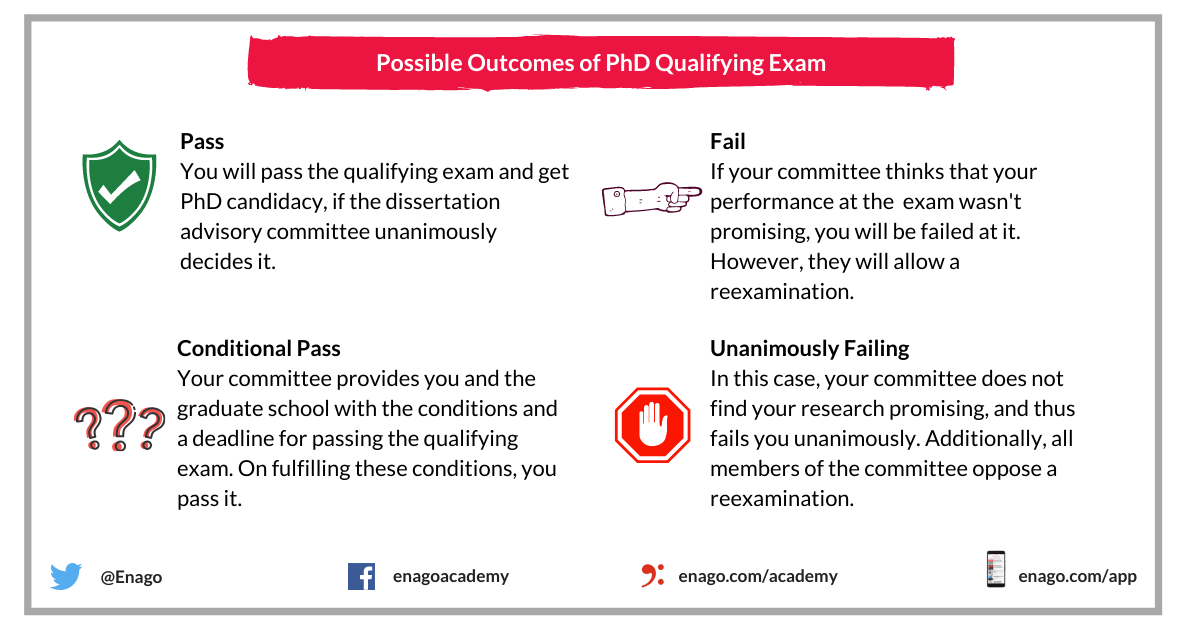6 Effective Tips on How to Ace Your PhD Qualifying Exam

It’s probably not your first day at the university and you are still exploring the campus, determining which place would be your “nook”. Just as you do, you find a place to sit and it then feels surreal as you reminisce, “How did I get here?”—from determining your areas of interest for research to finding the university that offers a suitable program, from drafting personal statements to finally receiving the acceptance letter. And as you are looking into oblivion surrounded by these thoughts, you feel content and just as you breathe a sigh of relief, you hear muttering sounds from some students passing by.
What do you hear? — “…something…something…Qualifying exam!”. And that’s when reality strikes you! Although you are in the program now, you must prove your candidacy for it by passing the PhD qualifying exam.
What is a PhD Qualifying Exam?
In simpler words, a PhD qualifying exam is one of the requirements that determine whether or not the PhD student has successfully completed the first phase of the program and if they should be recommended for admission to candidacy for PhD. It is also referred to as the PhD candidacy exam and is probably one of the most arduous times for doctoral students. Furthermore, it is imperative for all doctoral students to prove their preparedness and capabilities to apply and synthesize the skills and knowledge during the graduate program by appearing for the qualifying exam. An integral part of the qualifying examination is a research proposal submitted to the examining committee at least two weeks before the examination.
What is the Purpose of a PhD Qualifying Exam?
A PhD student is someone who enrolls in a doctoral degree program. Typically, a PhD program requires students to complete a certain number of credits in coursework and successfully pass qualifying exams, which is followed by the dissertation writing and defense. The purpose of a PhD qualifying exam is to evaluate whether the student has adequate knowledge of the discipline and whether the student is eligible of conducting original research.
This qualifying exam is a bridge that transforms a PhD student into a PhD candidate. The difference between a PhD student and a PhD candidate is that the student is still working through the coursework and is yet to begin the dissertation process, and thus do not qualify to present and defend their dissertation to receive their doctorate. This period of transition means there is no more coursework to complete or classes to take; it is a self-defined structure of work from now with guidance from your supervisors at regular intervals.
What is the Format of the PhD Qualifying Exam?
Just as no two research projects can be alike, so cannot the qualifying exams for two different students. Thus, rather than asking your seniors about the questions that they were asked, a better approach is to understand the format and the process of the qualifying exam.
Typically, a PhD qualifying exam is conducted in two phases: a written exam and an oral exam.
1. Written Qualifying Exam
After completing your coursework, the written qualifying exam is the first one that you must take. The aim of this exam is to assess your ability to incorporate your learnings from all of the different classes you took in the program to formulate research questions and solve your research problems. Ideally, each of your committee members will test you separately on this.
2. Oral Qualifying Exam
The oral qualifying exam is undertaken after completion of the written part. Its purpose is to evaluate your thought process and ability to conduct the research required to complete a PhD. Additionally, some universities require you to present your research proposal and defend it during your oral qualifying exam.
During the oral exam, each professor from your committee will ask few questions related to your research proposal and your answers from the written exam. Sometimes, the committee members may also ask you to draw your answers on the board, especially if it’s an equation, a molecular structure, mechanism, or a diagram.
4 Possible Outcomes of the Qualifying Exam
 “What if I Fail My Qualifying Exam?”- The Petrifying Thought
“What if I Fail My Qualifying Exam?”- The Petrifying Thought
Though this is the rarest situation that PhD students face, its possibility cannot be neglected. While the final result is based on what your committee members decide, they often give you a chance to retake the exam and meet certain conditions. However, if you fail the exam by unanimous decision of all committee members who oppose you from taking the reexam, you may have to leave the program and opt for another field of study or university.
But why should you be worried? You’ve got these nifty tips to crack your PhD qualifying exam!
Tips to Ace the PhD Qualifying Exam
Don’t you want to excel at your qualifying exam? Here are some things you should know!
1. Know Your Qualifying Exam Committee
- Identify the area of expertise of each committee member.
- Consult your seniors and other grad students who have worked with them and are currently working with them or have taken classes from them, or best—have had them for their own qualifying exam.
- Try to anticipate the pattern of their questions they are likely to follow and prepare your answers accordingly. However, do not spend too much time on this. It is likely, that your research proposal may give rise to a different line of questioning.
2. Know Your Subject
- Hit the library and stay updated with recent research in your field.
- Acquaint yourself with knowledge of your subject matter, as that’s what you’ll be tested on the most.
3. Know What is Expected of You
- Schedule a meeting with your committee members in advance, at least twice before appearing for your qualifying exam.
- Initiate a conversation about what you are expected to cover for the exam.
- Be an attentive listener and make note of their points as they speak.
- Ask them relevant questions so that you don’t get back to your room with doubts.
4. Know Your Plan
- Start with managing your time
- Organize your data and start writing the research proposal.
- Do not overcommit. Allot yourself 1–2 months of intense studying prior to the exam to master all the background and general knowledge you may need.
- Make your notes including textual as well as graphical content for quick revision.
- Request your supervisor or seniors to quiz you and critique your presentation. Work optimistically on their constructive suggestions.
5. Know the Challenges
- Presenting your proposal may at times be quite daunting. Hence, practice giving mock presentations during lab meetings or even in front of your mirror.
- Be prepared for technical as well as analytical questions.
6. Know the Do’s and Avoid the Don’ts
- While presenting, follow a narrative approach to keep the committee interested in your research.
- Explain your research briefly and add details as you are asked.
- Don’t overwhelm the examining committee with irrelevant details.
- Ensure that it’s a stimulating discussion among peers.
- Dress professionally and stay composed.
- More importantly, take a good night’s sleep before your exam day.
Final Thoughts
As my research advisor would say, “There’s only one step that keeps you away or brings you closer to your goal. It’s for you to choose the direction!” Similarly, the PhD qualifying exam is that one step you take to reach closer to the hallowed status of “Doctor”. So follow these nifty tips and share them with your friends and colleagues for we know what the future of research holds for us. Let us know the challenges you faced while preparing for your qualifying exam. How was it different from the experiences of your colleagues? You can also visit our Q&A forum for frequently asked questions related to different aspects of research writing and publishing answered by our team that comprises subject-matter experts, eminent researchers, and publication experts.









